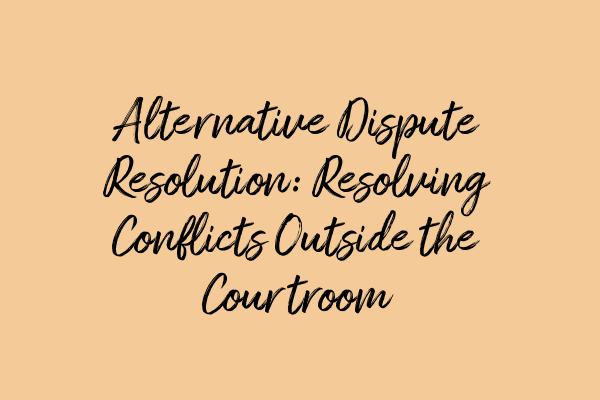Alternative Dispute Resolution: Resolving Conflicts Outside the Courtroom
When it comes to resolving legal disputes, the traditional image that often comes to mind is that of a courtroom with lawyers fiercely arguing their case in front of a judge and jury. However, there is an alternative approach to resolving conflicts that can offer more flexibility, cost-effectiveness, and often a quicker resolution. This approach is known as Alternative Dispute Resolution (ADR).
In recent years, the use of ADR has grown significantly as more and more people are recognizing its benefits. It provides a way for parties to reach a mutually satisfactory resolution without the need for a formal court process. ADR methods are less formal, less adversarial, and more focused on finding a practical solution that meets the needs of all parties involved.
One of the main advantages of ADR is that it allows parties to have more control over the resolution process. Unlike in a courtroom where a decision is imposed on the parties by a judge or jury, ADR enables the parties to actively participate in finding a solution that works for them. It promotes communication, collaboration, and the exploration of creative options that may not be available in a traditional court setting.
There are several types of ADR methods that can be employed depending on the nature of the dispute and the preferences of the parties involved. The most common forms of ADR include mediation, negotiation, and arbitration.
Mediation is a voluntary process in which a neutral third party, known as a mediator, assists the parties in reaching an agreement. The mediator facilitates productive communication between the parties, helps them identify their interests and concerns, and guides them towards finding a resolution that is acceptable to all. Mediation is often used in family law, employment disputes, and commercial disputes.
Negotiation, on the other hand, involves direct communication between the parties in an attempt to resolve the dispute without the involvement of a third party. Parties may negotiate directly with each other or with the assistance of their lawyers. Negotiation can be a highly effective method when the parties are willing to compromise and work towards a mutually beneficial outcome.
Arbitration is a more formal ADR method that resembles a mini-trial. The parties present their case to a neutral third party, known as an arbitrator, who then makes a binding decision. Arbitration can be less formal and more flexible than a courtroom trial, and the parties can often choose their arbitrator based on their expertise in the subject matter of the dispute.
So, why should you consider using ADR instead of going to court? Firstly, ADR can save you time and money. Traditional court processes can be time-consuming and costly, especially when considering legal fees, court filing fees, and the potential for lengthy litigation. ADR methods, on the other hand, are generally quicker and less expensive, allowing you to resolve your dispute more efficiently.
Secondly, ADR can provide a more amicable and less adversarial environment. By promoting open communication and collaboration, ADR methods aim to preserve relationships and find solutions that are mutually beneficial. This can be particularly important in situations where ongoing relationships need to be maintained, such as in family or business disputes.
Lastly, ADR can offer more privacy and confidentiality. Unlike a courtroom trial, which is open to the public, ADR proceedings are generally private and confidential. This can be advantageous when dealing with sensitive issues or protecting proprietary information.
In conclusion, Alternative Dispute Resolution offers a viable and effective alternative to traditional court processes. It allows parties to have more control over the resolution process, saves time and money, promotes amicable relationships, and provides privacy and confidentiality.
If you are facing a legal dispute and believe that ADR may be a suitable option for you, consult with a qualified solicitor who has experience in ADR. They can provide you with expert advice, guide you through the process, and help you achieve a favorable outcome.
For more information on legal practice and preparation, check out these related articles:
– SQE Prep Made Easy: Strategies and Resources
– SQE Prep: Tips and Tricks to Excel in Criminal Law
– Terrorism and Criminal Law: Balancing National Security with Justice
– Summary vs. Indictable Offences: Understanding the Differences
– Cross-Examination Techniques: Mastering the Art of Questioning
Remember, choosing the right approach to resolving your legal dispute is crucial for achieving a satisfactory outcome. Consider the benefits of Alternative Dispute Resolution and make an informed decision that aligns with your interests and goals.


Leave a Reply